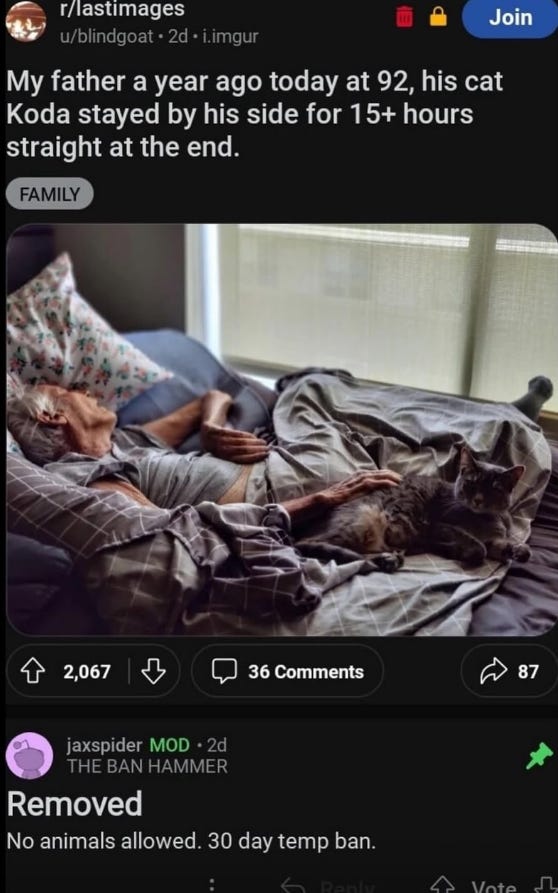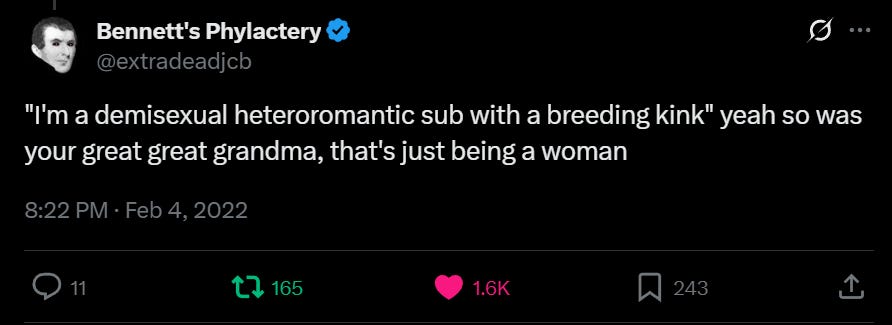Nominative mania
We are dying to classify ourselves and our world
There’s a subreddit called r/lastimages, a place where people share the last pictures taken of people before their deaths. It recently was the subject of a minor scandal when a moderator banned a user for submitting a picture of his dying father with his cat on the bed. The subreddit has a rule: no animals, only people.
This is very silly of course, but overly aggressive moderation of internet forums has been a perennial complaint since we measured speed in baud. We can all imagine why a moderator might have taken this seemingly draconian and absurd enforcement action. A more interesting question is: why is there a subreddit dedicated to cataloging “the last known photographs or videos of a person” at all? What purpose does it serve? What do the 474k members of this forum gain from browsing it?
But to ask this question is to question the premise of reddit itself, a place where obsessive classification of the world’s phenomena into a set of labeled drawers is, if not its raison d’etre, then at least its most popular pastime. There is a subreddit dedicated to GIFs that make you imagine a sound. There is one cataloging images to use as a reaction in lieu of a comment. There is one full of screenshots of people performing back-of-the-envelope math to answer hypothetical questions. There is a subreddit for things that irritate you a fair amount but not too much, and another for things that please you a fair amount but not too much. The latter has 1.2M members. Here’s a representative sample.
When an event happens anywhere in the world, when any piece of media is published, an army of redditors stands ready with a mental card catalog of possible locations to file it neatly away, and an even larger army of commenters and lurkers waits breathlessly for neatly labeled packets of content to shoot down the tubes they have chosen to subscribe to. Witness an altercation at the mall? That goes into r/PublicFreakout, where it will join tens of thousands of similar videos archived for eternity. Did you have a bad experience at the return counter at Costco or in an Uber? Write a paragraph of rant for r/LateStageCapitalism, where 831k other souls want to hear about it. And of course, if your cat was looking extra adorable this morning, you know just where to file that (“Important: Do not post pictures of cats which aren't yours”, be warned. Did you think these internet points were just being handed out for free?)
Reddit is also the world’s premiere forum for discussing boutique sexualities and genders invented some time in the last decade or so. If you’re a confused teenager who feels ineffably different from other kids but lacks the words to articulate how exactly, there are a simply staggering number of subreddits to help you find, name, and coax out your true innermost self.
There are better and more authoritative essays about the bewildering variety of this kind of identity so I won’t dwell on them beyond inviting you to gaze up at them in wonder with me, to marvel at their mystifying and variegated profusion. But to give one brief example, the flag in the top-right corner is for demisexuals, which applies to people who only feel sexual attraction to people with whom they have an emotional connection. It’s an official queer identity claimed by more than one female celebrity who you can now be quite certain is not a boring vanilla heterosexual.
One finds the same pattern with mental health diagnoses, from the garden variety OCD and ADHD to far more exotic ailments such as Rejection Sensitive Dysphoria (RSD), characterized by a hypersensitivity to criticism, or hyperphantasia, which means your mental imagery is so intensely vivid it impacts your daily life. Far from being disabilities as understood by previous generations, these diagnoses and pseudo-diagnoses are typically proudly displayed next to a user’s other biographical information in their online profiles, digitally worn as badges of honor and distinction. In these online personas one senses a profound relief, a satisfaction at having arrived, having settled on an answer and having found the right words to speak one’s self into being. Indeed, it’s not uncommon to hear people wearing these badges say as much explicitly. Their diagnosis (official or self-imposed) becomes a permission slip to believe about themselves what they have always secretly known to be true but perhaps lacked the vocabulary to express.





